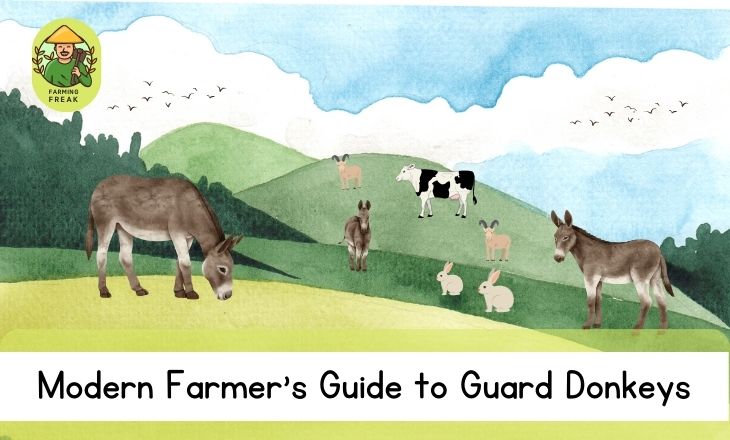According to A Farming Freak Guide to Guard Donkeys, a guardian donkey is a loyal and vigilant companion patrolling your pastures day and night, fending off potential predators with unwavering determination. From deterring coyotes and wolves to keeping stray dogs at bay, these intelligent animals have proven to be an indispensable addition to any farmer’s toolkit.
The Role of Guard Donkeys:
Guard Donkeys have been utilized for centuries to protect livestock from predators, and their role is often underestimated. These intelligent and loyal animals have an instinct to guard and protect, making them the perfect addition to any farm or ranch.
Unlike traditional guard dogs, donkeys offer a non-lethal approach to deterring predators such as coyotes, wolves, and even stray dogs.
What sets guardian donkeys apart?
Their innate sense of territoriality and protective behavior towards the animals they are tasked with safeguarding sets them apart. They form strong bonds with the livestock under their care and will fiercely defend them against potential threats.
Their unique ability to quickly assess danger and respond accordingly makes them an invaluable asset in maintaining the safety of herds without causing harm to the predators or using expensive technological interventions.
Guard Donkeys to Understand Donkeys’ Behavior and Instincts:
Guard donkieys play a vital role in protecting livestock as well in Alpaca Framing, as they have a strong instinct to bond with and defend their herd. This behavior is deeply rooted in their nature and has been honed through centuries of domestication.
Donkeys are naturally cautious animals, which makes them excellent at detecting potential threats and acting as a deterrent to predators such as coyotes and dogs.
Sensing a Threat
One fascinating aspect of guard donkey behavior is their use of vocalization to communicate danger to the rest of the herd. When sensing a threat, donkeys will emit loud brays that serve as an alarm call, alerting other animals to take cover or be on high alert.
This illustrates not only the protective instincts of these animals but also their ability to effectively coordinate with others in safeguarding the group.
Sense of Responsibility
It’s important to recognize that while guardiann donkeys are formidable protectors, they also possess a gentle and nurturing side towards the livestock under their care. They exhibit a sense of responsibility for the well-being of the herd, often demonstrating patience and compassion when interacting with other animals.
Understanding these nuanced behaviors can deepen our appreciation for the complex social dynamics at play within groups of domesticated animals.
Guard Donkeys for Selecting the Right One:
Selecting the right one for farm is a decision that can have a significant impact on the safety and security of your livestock. When choosing a guard donkey:
- It’s crucial to consider their temperament and experience with guarding duties.
- Look for a donkey with a calm and alert demeanor, as well as one who has previous experience working with other animals.
- Assess the donkey’s size and physical attributes to ensure they are capable of effectively warding off potential predators.
- It’s essential to take into account the specific needs of your farm when selecting a guard donkey.
- Consider the type of predators in your area and choose a donkey that has been trained or naturally inclined to deter those specific threats.

This may involve consulting with experienced farmers or animal behavior specialists to find the most suitable match for your farm’s unique circumstances. By considering these factors, you can ensure that you select the right guard donkey to fulfill its vital role in protecting your valuable livestock.
Training and Integrating Guard Donkey Protecting Livestock Ideas:
Guard donkeys are often known as donkey sentinels or donkey protection livestock. Their instinct to bond with and protect smaller animals, combined with their superior hearing and powerful, intimidating presence, makes them effective guardians for herds of sheep, and goats, or even cattle.
When integrating a guard donkey into a livestock protection plan It’s crucial to allow the animal time to familiarize itself with the herd and establish a bond with the other animals.
This process may take several weeks or even months but is essential for the effectiveness of the guard donkey, proper training and supervision are necessary to ensure that the donkey understands its role in protecting the livestock without causing harm to them.
why are donkeys good guard animals?
Donkeys have proven to be effective livestock guardians, providing protection from predators such as coyotes and wolves. In 2024, the trend of using donkeys as protectors on farms is gaining traction due to their innate instinct to defend their territory. Guard donkeys require minimal training and are a cost-effective solution for farmers looking to enhance the security of their livestock.
Why Are Younger Donkeys Often Preferred For Guard Duties?
These are often preferred for guard duties due to their adaptability and ability to form strong bonds with the herd.
By engaging in positive reinforcement training methods and creating a safe environment for the livestock and the guard donkey, farmers can effectively integrate these unique protectors into their operations while providing an added layer of security for their valuable animals.
Maintaining and Caring for Guard Donkeys
These are some maintaining and caring while guarding donkeys:
Regular Health Checks
Guardian donkeys require regular health checks to ensure they are in optimum condition for their protective duties. This includes vaccinations, dental care, and hoof trimming. Donkeys are prone to conditions such as laminitis and parasites, so it’s crucial to keep a close eye on their health.
Social Interaction
Donkeys are social animals and thrive when given ample opportunities for interaction with other animals or humans. In a guard donkey setting, providing them with companionship from other donkeys or even goats can help alleviate boredom and reduce stress.
Proper Nutrition
Guardian donkeys need a diet that consists of high-fiber hay, fresh water, and vitamin/mineral supplements as needed.
It’s important to pay attention to their dietary needs and avoid overfeeding treats or grains which can lead to weight-related health issues, providing access to pasture grazing is beneficial for their overall well-being.
Training Sessions
Focus on reinforcing guarding instincts and proper behavior are crucial for the effectiveness of guard donkey’s.
Consistent reinforcement of basic commands such as stay and back off helps them understand their role in protecting the herd from predators.
Positive reinforcement techniques using treats or praise can encourage desired behaviors and strengthen the bond between the handler and the donkey.
Benefits of Using Guardian Donkeys on a Farm In 2024
The benefits are as follows:
Increased Security
Guardian donkeys can effectively protect livestock by deterring predators such as coyotes, dogs, and even mountain lions. Their territorial instincts and loud braying serve as a natural deterrent, reducing the risk of predation on the farm.
Low Maintenance
Unlike traditional livestock guardians like dogs, guardian donkeys require minimal training and upkeep. They are relatively independent animals that can thrive in harsh weather conditions and rugged terrain without much human intervention.
Cost Efficiency
Utilizing guard donkeys can be a cost-effective alternative to other forms of predator control. They do not require expensive equipment or ongoing expenses associated with electronic fencing or chemical deterrents. This makes them an economical choice for farmers looking to protect their herds while minimizing additional costs.

Final Thoughts
Guard donkeys are a valuable and effective tool for modern farmers to protect their livestock from potential threats. With their instinct to protect and their low maintenance requirements, guardian donkey’s offer a sustainable and cost-effective solution to predator control.
By understanding the unique needs and behaviors of these animals, farmers can successfully integrate them into their existing livestock management practices. We encourage farmers to consider incorporating guard donkeys into their operations as an environmentally friendly and ethical approach to predator management.
FAQs
What Are The Best Guard Donkeys?
The best guard donkeys are typically large, strong, and territorial breeds such as the Mammoth Jackstock or the American Mammoth Donkey. These breeds have an instinct to protect livestock and can be effective at deterring predators such as coyotes and dogs.
What Are The Best Guard Animals For Farming?
The best guard animals for farming are typically livestock guardian dogs, such as the Great Pyrenees, Anatolian Shepherds, and Maremmas. These breeds are known for their protective instincts and ability to deter predators from attacking farm animals.
Do Donkeys Protect Goats?
Are donkeys Protective? A donkey can protect goats by using its loud braying to alert the herd of any potential threats. Donkeys are also known for their strong and protective nature, often standing up to predators that may threaten the goats, their size and strength can act as a deterrent to potential predators, keeping the goats safe from harm. Donkeys are excellent guard animals for protecting a herd of goats.
- Can Ducks Eat Mushrooms? Unexplained Benefits and Risks - May 25, 2024
- Unveiled Capon Chicken: Capon Chicken Nutritional Benefits - May 25, 2024
- Can Goats Eat Cilantro? Exploring Benefits and Risks - May 24, 2024

